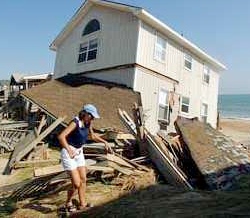 As Hurricane Irene bears down on the East Coast today, I talked with a friend this morning who lives in the path of the storm and asked how things were there.
As Hurricane Irene bears down on the East Coast today, I talked with a friend this morning who lives in the path of the storm and asked how things were there.
“I’ve been trying to get everything ready for when the hurricane hits,” she said. “I wasn’t that worried, but then the governor said yesterday that it was going to be even worse than [Hurricane] Isabel in 2003 — and that just scared me to death.”
Indeed, Virginia Gov. Bob McDonnell told reporters Friday to expect the worst:
“The storm surges, the flooding and the winds will be broader in scope than what we experienced [during Isabel]. So those who lived through that eight years ago in Virginia be prepared. It will likely be worse this time around.”
The television and online news people were keeping people worked up about the storm, too, with constant reports about how bad things might become and what people should do to prepare. Even though there’s absolutely nothing new about how to prepare for a hurricane, the news has been full of scary reports.
In the meantime, I noticed a private weather forecasting company on Friday saying something entirely different. The message from Advanced Forecasting Corp. was that the storm wasn’t going to be a big deal. Advanced Forecasting CEO Dr. Simon Atkins said on Friday that the hype over the storm was overblown:
“The demise of Irene has already begun. There is no visible eye. The storm intensity is down to 99 mph. This would be a low-end category 2 or a strong category 1 storm, while 36 hours ago some predicted a catastrophic category 4 storm. Air Force Reserve aircraft have found that Irene’s eyewall has collapsed, and the central pressure has risen — rising pressure means a weakening storm.”
How can politicians and media be whipping folks into a frenzy about one of the worst storms ever, but a private forecaster was saying it wasn’t going to be a big deal? Could it have anything to do with their differing incentives?
 People act in ways that are consistent with their incentives, even when they’re not consciously aware of what they’re doing. In the case of the media and politicians, they have an incentive to work the crowd into a frenzy. The media want you to keep your eyes glued to their TV screens and hitting reload on your browser every few minutes — clicking some ads along the way, of course. Politicians want you to keep your attention on them because it reinforces one simple notion. It makes you believe that you need them — and that they are your leaders.
People act in ways that are consistent with their incentives, even when they’re not consciously aware of what they’re doing. In the case of the media and politicians, they have an incentive to work the crowd into a frenzy. The media want you to keep your eyes glued to their TV screens and hitting reload on your browser every few minutes — clicking some ads along the way, of course. Politicians want you to keep your attention on them because it reinforces one simple notion. It makes you believe that you need them — and that they are your leaders.
If a politician tells you that a storm is going to be terrible and it’s not, a few people might grumble about being fooled, but most people are just going to be thankful that it wasn’t as bad as was feared. However, if a politician gives you a realistic look — instead of a worst-case scenario — and something bad happens, he’s going to be blamed for not having taken it more seriously. In either scenario, he has the incentive to take the worst-case approach. If it’s bad, he gets to show that you need him. If it’s not, he doesn’t take the blame.
Scared people give up their freedoms. People were happy to give up liberties after the 2001 terrorist attacks. They’re happy to turn over more parts of their lives if they believe someone can protect them from hurricanes or tornadoes or attacks from Mars.
By mid-morning Saturday, the CEO of the private weather forecasting company was making fun of his fellow forecasters on the Weather Channel:
“On TWC, they are desperately trying to find something, a shingle, a nail. It’s getting embarrassing.“
When someone tells you something, pay attention to the incentives he has — and remember that a politician’s biggest incentive is to find ways to make you believe you need him.
 Florida requires drivers to hand over personal info — which it then sells
Florida requires drivers to hand over personal info — which it then sells The things we regret the most show us what we really value
The things we regret the most show us what we really value As a child, I was a very capable liar, because I learned from a narcissist
As a child, I was a very capable liar, because I learned from a narcissist